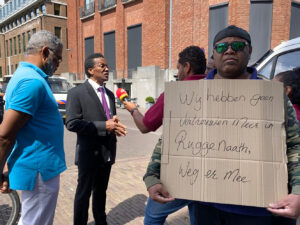THE HAGUE – The rate at which Aruba, Curaçao, and Sint Maarten have to implement reforms in order to get emergency lines of credit from the Netherlands is ‘too high’. That is what the ministers plenipotentiary for Aruba, Curaçao, and Sint Maarten said after the Kingdom Council of Ministers meeting on Friday.
Due to the worldwide corona crisis the economies of the Caribbean islands have collapsed. The islands have become dependent on emergency financing from The Hague, especially because the tourism industry has collapsed.
Aruba, Curaçao, and Sint Maarten have to make cuts in the civil servant expenses and the pension costs in exchange for those loans. They warned on Friday that the pressure to push through reforms ‘in the space of one month’ is not realistic.
Deliberations with unions have to happen faster
The islands don’t seem to have the capacity, because experts are involved with managing the corona crisis. Additionally cuts cannot be made to salaries and employment benefits without first consulting with the unions, says minister plenipotentiary for Curaçao Anthony Begina. “That could never happen in the Netherlands.”
“The situation in the Netherlands is different, we don’t ask other countries for financial support”, says Knops. He hopes that Curaçaoans with a collective labor agreement will show ‘more solidarity’ towards the unemployed. According to the state secretary, Aruba ‘has shown that it is possible’ to come to an agreement with the unions quickly.
The Hague will set more demands
On Friday July the 10th there will be an extra session of the Kingdom Council of Ministers about the third emergency line of credit. An amount of about 350 million euros has already been handed out as budgetary support. “If the economy doesn’t recover more quickly, that amount could reach one billion”, says Knops.
The expectation is that the Dutch government – with the support of Parliament – will continue to set demands. These won’t be ‘crazy demands’ according to Knops. “We’re asking the countries to do things which they have not done during the past few years. They’re asking us for hundreds of millions and in such a case you can’t ask them in two years’ time: would you like to implement some reforms?”
Situation differs per island
“We still haven’t received any documents about the new conditions”, says René Violenus of Sint Maarten. “The state secretary promised us that we would have them on Monday. Hopefully it happens, because we’ve been waiting on them since last week.”
The minister plenipotentiary for Aruba mentions that the situation differs per island and wants the Netherlands to take that into account.
Curaçaoan protest in The HagueAbout twenty Curaçaoans went to the Malieveld on Friday to protest the budget cuts on their island. They are worried about the unrest on the island and that ‘the less fortunate will be affected most’. One of their demands is that prime minister Eugene Rhuggenaath of Curaçao steps down. The group wanted to hand over a petition to prime minister Mark Rutte, but he was busy doing his weekly press conference. It seems they didn’t make an appointment. The police decided to bring them to the Binnenhof anyway, so that they could leave their letter of protest in Rutte’s mailroom.  Curaçaoans who live in the Netherlands protest in The Hague against the budget cuts on their island – Photo: John Samson
|



